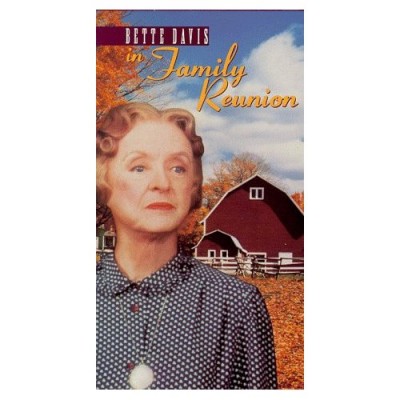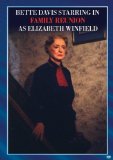| Reviews & Columns |
|
Reviews DVD TV on DVD Blu-ray 4K UHD International DVDs In Theaters Reviews by Studio Video Games Features Collector Series DVDs Easter Egg Database Interviews DVD Talk Radio Feature Articles Columns Anime Talk DVD Savant Horror DVDs The M.O.D. Squad Art House HD Talk Silent DVD
|
DVD Talk Forum |
|
|
| Resources |
|
DVD Price Search Customer Service #'s RCE Info Links |
|
Columns
|
|
|
Family Reunion

Despite my personal opposition to the Michal Bay variety of summer blockbuster, it would be unforgivably hypocritical of me to claim that I am really any less susceptible than the next person to the temptations of mindless, fluffy, escapist, trashy movies. It's just that the kind of trash I happen to prefer is worlds away from the assaultive, expensively made, high-grossing variety whose titles grace the marquee at the multiplex when the kids are out of school and it's hot outside. My preferred type of time-wasting, sheepishly confessed-to entertainment is better exemplified by something like Fielder Cook's Family Reunion, a made-for-TV movie aired on NBC in 1981 and starring the aging but irrepressible Bette Davis as a spinster aunt, the matriarch of the little Northeastern town her WASP ancestors founded, who has to marshal her entire extended family back there in order to save it from ugly modernization.
Director Fielder Cook, a veteran of television who decades earlier, in 1955, did the wonderful "Patterns" (which is available on Criterion's The Golden Age of Television) for Kraft Television Theater, was certainly capable of doing something stellar with the right material, and his proficiency is apparent even here. But this is not that higher-brow type of TV. Quite the opposite: Family Reunion is a two-part movie/miniseries from deep within those long doldrums between TV's first golden age and the recent Six Feet Under/Mad Men pay-TV renaissance. Knowing that Cook's film is based on a "Ladies Home Journal" article tells you everything you need to know about what degree of subtlety, insight, or profundity to expect; this is a hamfisted soap opera, plain and simple, and it has almost precisely the same production values as an episode of Little House on the Prairie. Which is not to say that it is terrible, exactly, but it is visually and narratively bland and broad enough to be identifiable as television from when that meant always and obviously inferior to the cinema.
And yet...Family Reunion holds a charm for me that is so subjective, I'm almost loath to admit it. A great deal of that comes from Davis, who, even as an elderly figure, still possesses the tremendous charisma that made her one of the great movie stars (I think she was a very good actress, too, but that is often beside the point in discussions of her and her legend). The character she plays, Elizabeth Winfield, is tailor-made for her: stubborn, regal, ferociously independent and constitutionally incapable of tolerating anyone's nonsense. Winfield is a former schoolteacher of the sort that will correct her current and former students' grammar until the very day she dies. She has never married and still lives in a family home near the town her forebears established, also called Winfield, where she is a local legend and fixture after having taught most of the town's residents at one point or another. The rest of the Winfields are spread far and wide, and the first episode of Family Reunion involves the just-retired Elizabeth's visits to several of them, including a trip to Washington, D.C. to catch up with her nephew Chester (John Huddleston, instantly recognizable, even 17 years earlier, as the future wheelchair-bound "big" Lebowski from The Big Lebowski), a powerful senator whose outward agreeableness masks a coldhearted dedication to "progress," big business-style; and another trip to New York to drop in her niece Luisa, who despises the notion of family because her father, Elizabeth's one-time fiancé who eventually married the other Winfield sister after Elizabeth broke off their engagement, was an alcoholic. Elizabeth makes these journeys by bus using a standing ticket that was given to her as a retirement present with rather suspicious eagerness by some not entirely trustworthy-appearing members of the town's business community. They did, as it turns out, want to get rid of her, but behind their scheming, it is her geographically scattered family, each member of which has a share in the vast Winfield property surrounding Elizabeth's home, that is being lobbied and organized by Chester to sell off their heritage in order to build a shopping mall on the sacred family ground, which would result in the exile of Elizabeth from her home, not to mention the trashing of a pristine New England landscape.
Fortunately, while in New York visiting family, Elizabeth has run into a former student, James (John Shea, Missing), now a big-city lawyer who is becoming disillusioned with the rat race and is longing for the simple integrity of good old Winfield. She develops a two-pronged plan for staving off the more greedy, materialistic elements of her family: bring the entire clan together over a weekend on the estate for a huge family reunion in order to remind them of the importance of their heritage; and, from the legal end, call in a favor from James, who moves back to Winfield to set up a practice, with Elizabeth and her underdog anti-mall crusade as his first priority. The reunion is a success, offering Luisa the chance to reconcile with her father, in addition to numerous other resolutions of family tensions (not to mention the opportunity to apply all the subtlety and probing of an afterschool special to "issues" like women with careers, cohabitation without the benefit of wedlock, the mentally disabled, and interracial marriage). Can the good part of the family defeat the political and familial clout of Uncle Chester and save the day for the deeper, pre-Reaganite values (remember, this was 1981) to which the hastily built, pavement-spreading suburban shopping mall is, at least in the film's eight-lane-wide semiotics designed for even a slow child to grasp, the antithesis?
I could regale you for a good long time with the depths of lameness and almost bizarrely pedestrian "wholesomeness" to which Family Reunion, true to its era's relegation of TV to the basement in the house of culture, is all too willing to sink (near the top of this list would be the nepotistic presence of child actor J. Ashley Hyman, Davis's real-life grandson, as neighbor boy Richard; his character and performance are every nails-on-a-chalkboard cliché of some unbearably "cute," smart-ass sitcom kid). Instead, I will give you a simple formula by which to deduce whether it's for you: if you have always found yourself immune to the charisma of Davis, if you can watch Now, Voyager or The Letter with your arms folded, carping about their implausibility and sentimentality instead of giving in to their glorious golden-era craft and the gravitational pull of Davis's star power, Family Reunion is not your poison. If, however, you can recognize the glow that the very presence of Bette Davis, even in her 70s, casts into the furthest corners of each insipid frame she graces, blinding you to the film's flaws with her regal dignity and clipped utterances (her delivery makes every line, never mind how wooden, sound like a Wildean epigram), then Family Reunion will have all the appeal of an illicit indulgence. In the right mood, the time you waste on this big slice of bad TV will seem--like any really pleasurable, completely useless, blissfully mindless decadence--well worth forgiving yourself for.
THE DVD:
Sony continues its streak of making above-and-beyond M.O.D. (manufactured on demand) DVD editions of films from its vaults with a practically squeaky-clean, digitally restored 1.33:1 (original TV aspect ratio) transfer of Family Reunion. The visuals will not have any jaws dropping, but all the colors are clear and vivid, and the film's 35 mm texture is nicely preserved here.
Sound:The Dolby digital 2.0 mono soundtrack is just fine, as crisp and full as could be expected. Designed to emerge from tiny little built-in TV speakers circa 1981, the film's modest sound design is easily handled by DVD technology and has been transferred onto disc by Sony with all due care.
Extras:As is standard for M.O.D. discs, no extras.
FINAL THOUGHTS:Family Reunion is as bad for you as any loud, CGI-infested popcorn movie, but it's a cozier, less aggressive kind of bad, and the cherry on top of these empty calories is the eternally watchable Bette Davis. If you are of the right vintage and had the experience of staying home from school sick, getting taken care of and watching years-old, threadbare, mostly-forgotten movies and dramas like Little House on the Prairie and The Waltons rerun on TV, you are already familiar with both its ludicrous greeting-card aesthetic and the circumstances in which that kind of thing just hits the spot. Wait until those circumstances present themselves (some rainy day when you're running a temperature, for example), then make yourself some cinnamon toast and hot chocolate and settle in for some mindlessly reassuring, shamefully satisfying fun. Recommended.
|
| Popular Reviews |
| Sponsored Links |
|
|
| Sponsored Links |
|
|
| Release List | Reviews | Shop | Newsletter | Forum | DVD Giveaways | Blu-Ray | Advertise |
|
Copyright 2024 DVDTalk.com All Rights Reserved. Legal Info, Privacy Policy, Terms of Use,
Manage Preferences,
Your Privacy Choices | |||||||














